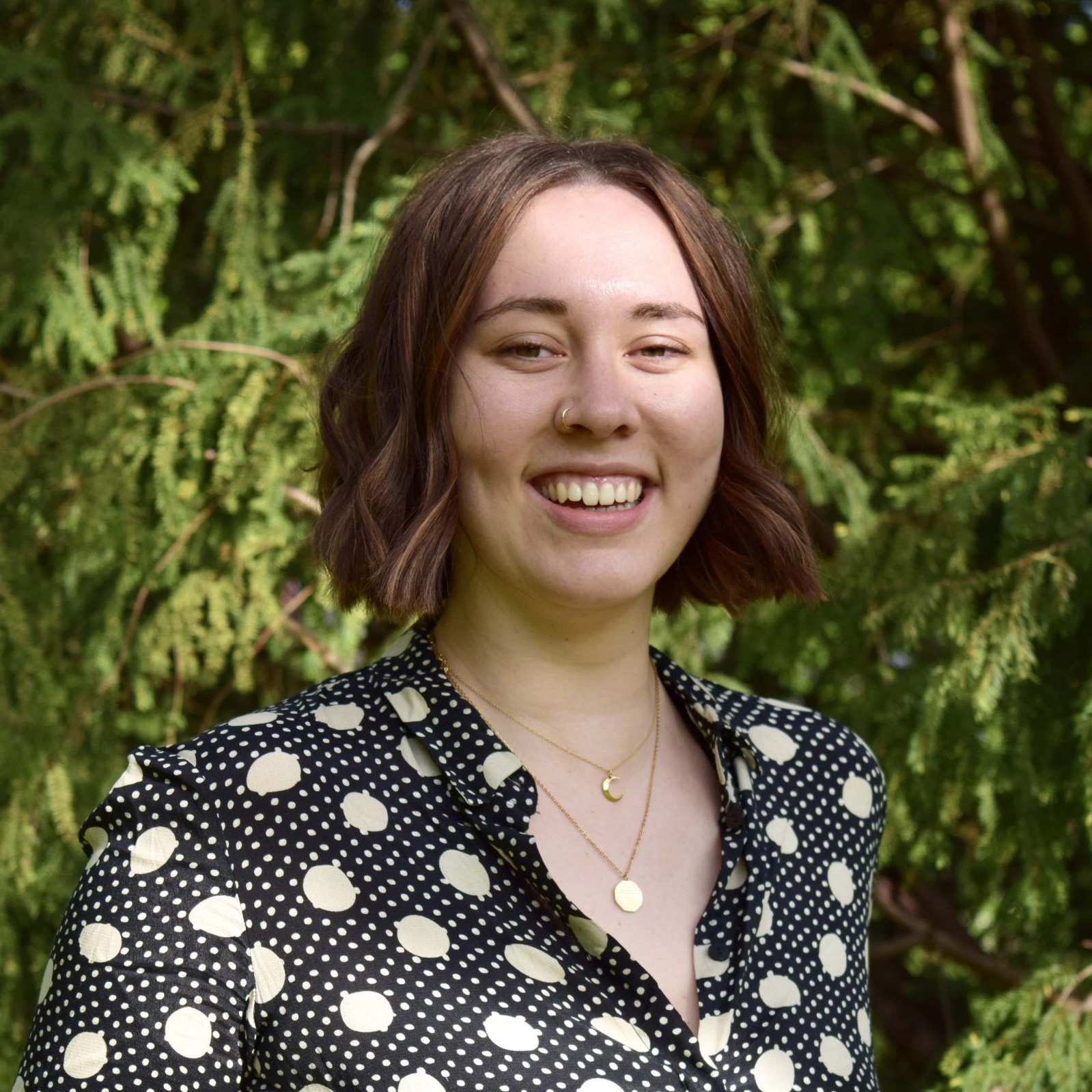Urban planning can no longer be business as usual, and cities need to allow for the necessary innovation to tackle the world’s environmental problems. We talked about these topics, among others, with Florian Lorenz, ecologist, landscape architect, and activist.
Florian Lorenz is not only an educated ecologist but overall a man of many talents. As a landscape architect, a consultant for cities, an urban planner, and a passionate activist, he’s driving change in cities in a way that everyone finally has to face the truth – business as usual will destroy our planet.
We talked with Florian about his new studio, his plans to bring Superblocks to Vienna, and how the imperfection of cities might bring perfection to urban life.
Interest in Sustainability
Maybe you had a similar dream as a child as Florian who, at the age of five, wanted to become an environmental activist saving whales and protecting forests. The ecosystem and everything that keeps it alive was always of interest to him, hence, he started to study ecology.
Throughout his studies, Florian worked holistically, trying to involve as many aspects as possible in his thesis on the lifecycle of biofuels and other papers on urban ecology – concentrating on cities as a whole. An approach he continued in his later projects. However, he realised that ecology alone would not satisfy his interests, so he additionally studied landscape architecture and landscape planning.
While Florian was already keen on sustainability and city planning during his studies, his interest in mobility occurred towards the end of his university career. This was when he studied in Copenhagen, where he, to no one’s surprise, enjoyed cycling much more than he previously ever did in Vienna. During a sabbatical in New York and a stint in China, he started working with Smarter Than Car, advocating for post-carbon mobility – his activism work had begun.
Returning to Vienna, he worked in an office involved with communication and planning of the urban transformation process. Finally, in 2017 Florian was able to register his own business.
“I just wanted to decide for myself which topics I wanted to work on, so I started various research projects and finally passed my exam to register an office for landscape architecture and landscape planning.” Together with his partner Georg Wieser he co-founded his own company in 2021 – studio LAUT (Landscape Architecture and Urban Transformation). It is an “interdisciplinary studio for landscape architecture, landscape planning, design and communication, and is active in the fields of public space, post-fossil mobility, and urban development”, Florian explains.
Florian sees a city as part of a global landscape. He is approaching projects with the realisation that every decision of city planning has impacts on our climate and our lives.
“In the context of the Anthropocene [the current, human-impacted geological era], we see sustainable design as a chance to transform our way of life. This, whether you call it mobility transformation or climate change adaptation or degrowth, is a process with many different facets.”
Superblocks – But Evolve!
A few projects Florian is implementing are all about the concept of Superblocks. If you want to know what this idea is all about, take a look at our article about Superblocks in Barcelona.
Supergrätzl – The Vienna Version of Superblocks
Together with the Vienna University of Technology and the Austrian Institute of Technology, Florian started the research project SUPERBE back in 2018. During this pilot research study, the team looked at the feasibility of and potentials for implementing Superblocks in Vienna.
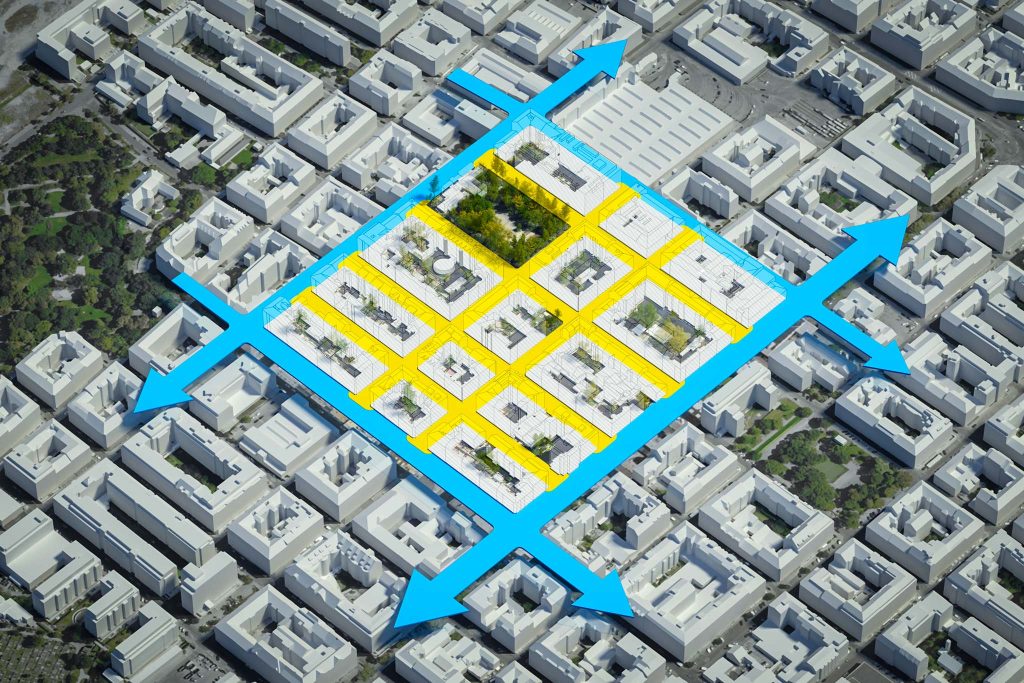
For Florian, this journey began in 2017 when he was in Barcelona experiencing the Superblock pilot in Poblenou first-hand and wondering if it were possible to apply this concept in Vienna. He then identified a potential research funding that enabled the project consortium to investigate potentials for Superblocks with an emphasis on energy (and carbon-emission) savings in the exploratory research project SUPERBE.
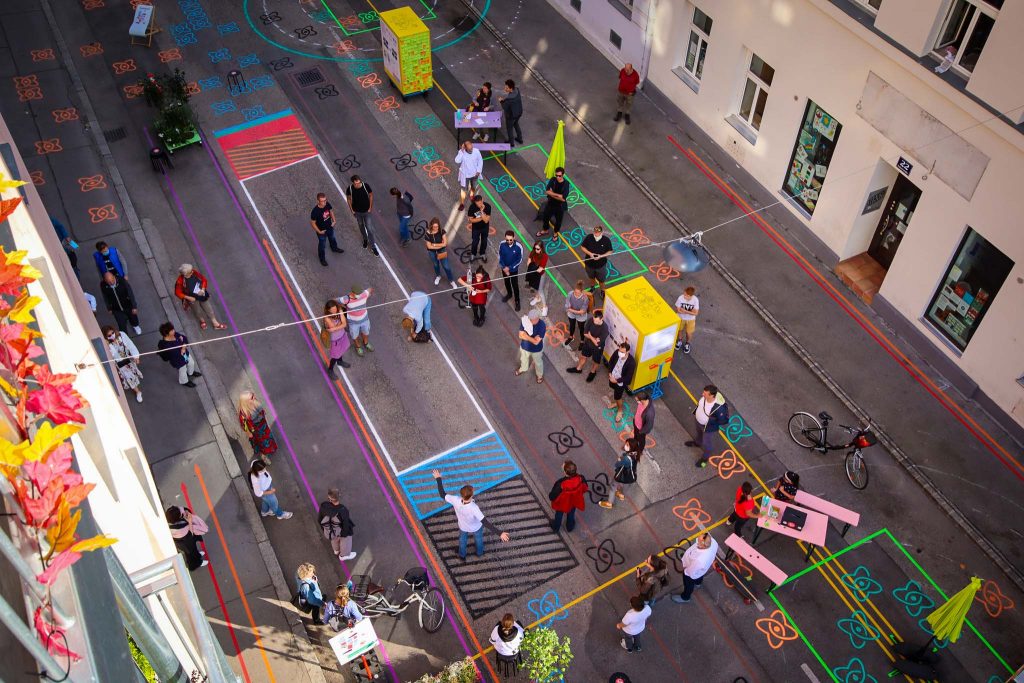
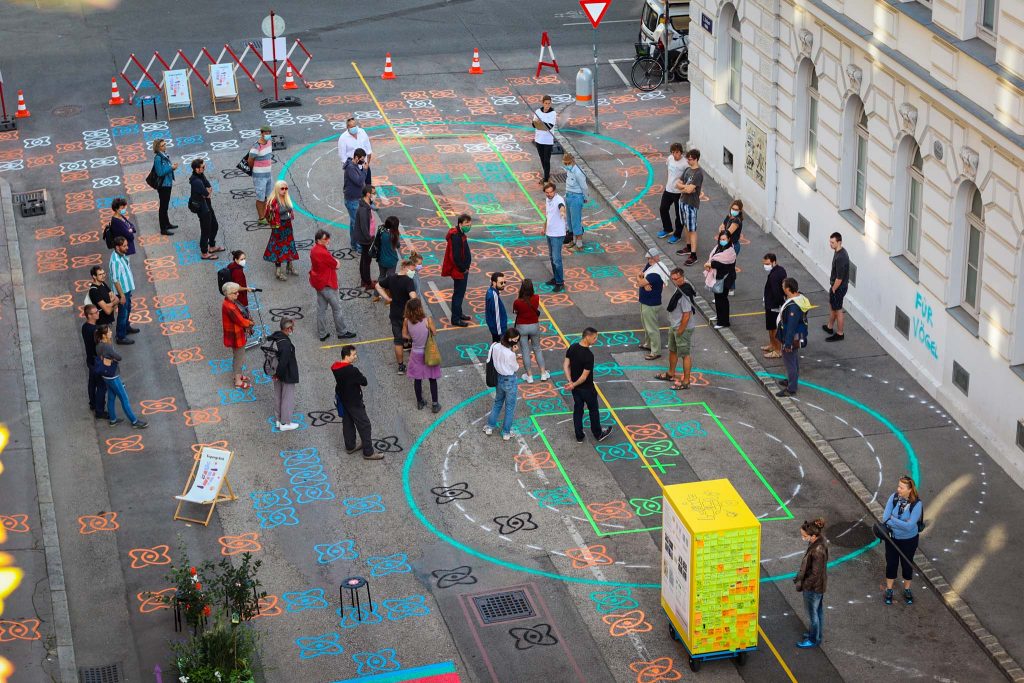
The project gained interest and recognition, even earning a prize for best research project in Austria in the field of mobility in 2020. Along the research project, the concept of Superblocks was also getting more popular in the urban field in Vienna. As Florian remembers, “during the Vienna city council election, politicians talked about the Superblocks and later the concept of Superblocks appeared in the programme for the current city government”.
While Florian has now been able to work on this project for more than three years, he sees the necessity of research and innovation projects to successfully bring their innovations into (built) implementation afterwards. He sees the responsibility and work of studio LAUT to “be a link between research institutions and cities, so that r&d projects benefit from an actual implementation perspective”.
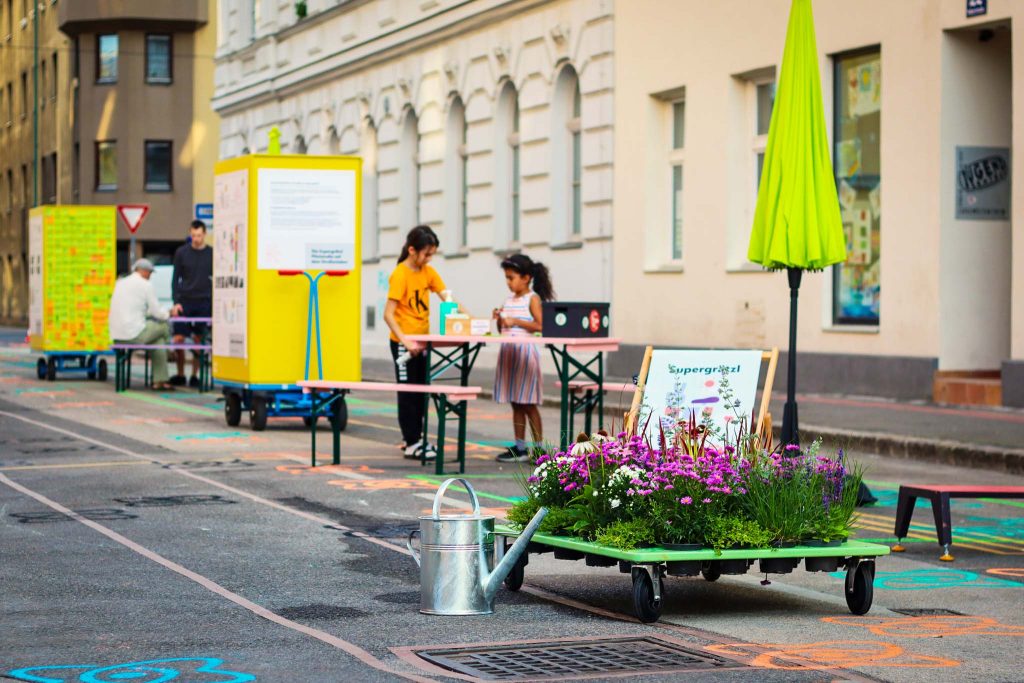
Tuning Your Block
Currently Florian is working with a pan-European consortium on a follow-up project – Tune Our Block – funded within the JPI Urban Europe fund. A consortium with partners from Vienna, Berlin and Ljubljana is aiming to expand the Superblock concept as a strategy for urban transformation. The idea is to adapt the prototypical idea of Barcelona’s Superblocks to Central European cities, while “supplementing them with other topics such as gender-sensitive planning or spatial energy planning”, Florian explains. Tune Our Block will develop effective implementation and involvement strategies for Superblocks as strategy to drive complex urban transformation processes.
The research consortium brings in a broad range of urban actors that drive change in cities – city administration, planning practitioners, research institutions as well as activists and NGOs. In Berlin, the NGO Changing Cities and the research institutions DIFU and IASS teamed up. In Vienna, the City’s Municipal Department for Urban Planning and Development – MA18 – joined in with the research institution Austrian Institute of Technology, the NGO Smarter Than Car, and Vienna University of Technology acting as project leader. To which Florian asserts: “It’s always good to have a lager partner in the consortium that has all the resources and continuity to lead projects. Although we as a small enterprise are very involved with the initial conception and subsequent innovation, I prefer when the project management is done by a large institution.”
The Vision of Studio LAUT
Multi-faceted is probably a fitting word to describe Florian and his work. In addition to Superblocks, he has recently worked on an open streets concept for Vienna to open up a network of streets for pedestrians and cyclists on Sundays, inspired by Bogota’s Ciclovia.
“The exciting thing is that we are able to work on ideas at different scales at studio LAUT. We have everything from a small urban intervention scale with the Parklet 2 Go to the neighbourhood scale with Superblocks up up to the citywide scale with concepts for Open Streets events.”
While Florian admits the importance of experts in specific city areas, he personally believes that “it is very exciting to think outside the box, to open up new perspectives”.
“I don’t see why you should lock yourself up in a small segment.”
No More Business As Usual!
As an ecologist, Florian knows what he is talking about when it comes to sustainability and the state of our ecosystem. Thus, when looking at how cities are planned and politicians govern, Florian critiques that very few decision-makers have a substantial background of ecological thinking.
“Unfortunately, we as humans seem to believe that people with an economic or legal education have the adequate competences for making decisions that will ultimately have ecological consequences for the basis of our life-support system on this planet.”
Additionally, we humans are conditioned to walk this earth thinking it will stay unchanged forever. As a result, as Florian puts it:
“We are just in the process of screwing it up. With this business as usual approach, it’s at times a rather depressing scenario, but giving in to a fatalistic “it’s anyway too late”-approach is no option.”
Experts have a hard time accepting our inaction on climate change and biodiversity destruction, and the belief of decision-makers that we’ll “somehow manoeuvre ourselves out of it with technology”. Florian believes “it is a mistake and a denial of reality if we still believe today that we are detached from the biosphere”, especially when “people in charge don’t recognise these facts. In all of this it will be paramount to see the ecological and the social crisis in tandem.”.
So instead of waiting for others to catch up to reality, Florian is actively seeking change. Even though his projects don’t primarily focus on biodiversity, he sees it as a necessary context for his work.
How Cities Should Be
Innovation and rethinking established ways are inherent to Florian’s work and activism. Hence, in a future according to Florian, cities need to be effective laboratories that enable innovation and change while matching the carrying capacity of our planet.
“The perfect city is actually the city that is not yet finished or would not claim itself to be perfect because it constantly wants to reinvent itself.”
People move to cities to live in areas of density, to have amenities across the board – “that’s education, culture, sports, jobs, business, inspiring people, and socialising. This is dense, urban life”. However, Florian hopes cities become more aware of what they feed on, as low resource-use and emission-footprints in cities are also a result of production that is taking place somewhere else.
For the future, Florian urges us to think about cities “in a way that they are in harmony with their surrounding areas, especially agriculturally in a localised way but also on the commercial, industrial, and economic level on a global scale”.
Advice for Other CityChangers
In his years of consulting cities and working with people, Florian learned that exchange is the most valuable asset for change. “It’s really important to exchange ideas with people who are either interested in the same thing or not interested in the same thing at all, but you have to make sure that you learn from each other.”
Most importantly, however, on the one hand “see the potential that things can indeed change”. And on the other hand, be aware “that urban development needs patience too and can be like cultivating a garden. It needs much attention, many different skills and constant work. But you may be surprised with lasting and unexpected beauty.”
This is why, Florian additionally advises to not hold back: “If you have ideas, communicate them strongly to the responsible decision-makers and stay at it. Trust your city changing guts and brain!”
If you want to read more about car-free cities and projects, check out our articles on Ghent, Pontevedra and Vienna.


